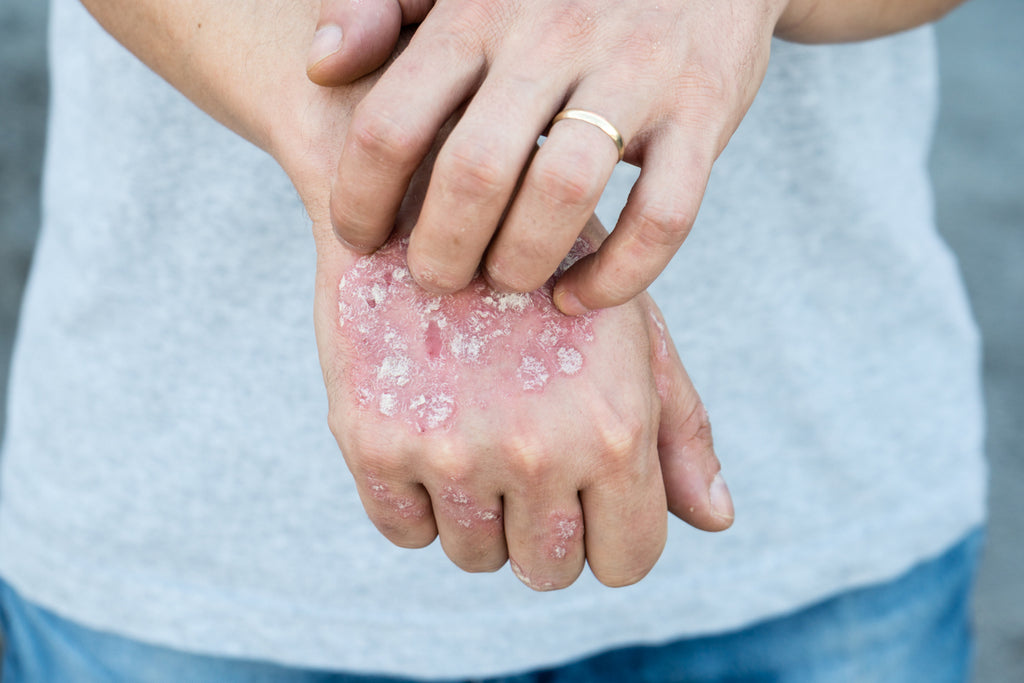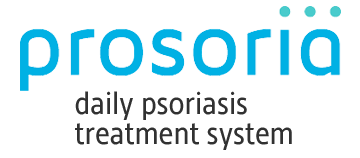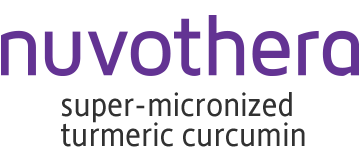5 Most Common Psoriasis Triggers
23 Mar 18

When it comes to dealing with psoriasis, self-awareness can make a massive difference — and that’s especially the case when it comes to understanding your psoriasis triggers. While everyone’s psoriasis triggers are slightly different, both research and anecdotal evidence show that many people with psoriasis have more than a few triggers in common. Understand these common psoriasis triggers, and avoid them, and you could be one step closer to healthier, clearer skin.
Alcohol, gluten, and nightshades may be associated with psoriasis flares
While research linking psoriasis breakouts to diet is still limited, evidence is building that reducing certain foods (and adding others) could have a major effect on patients’ symptoms. One study, which examined responses in over 1200 psoriasis patients after dietary changes, recorded that 53.8% saw psoriatic skin improvement after reducing alcohol, 53.4% after reducing gluten, and 52.1% after reducing nightshades, which include widely-loved foods such as tomatoes, potatoes, eggplants, bell peppers and chili peppers.
In addition, the same study found that 44.6% of patients saw improvements after adding fish oil/omega-3, 42.5% after adding vegetables, and 41% after adding oral vitamin D. So, it might not just pay to remove ‘bad’ foods from your diet, but to increase ‘good’ foods as well.
Smoking can also worsen psoriasis symptoms
When it comes to smoking and psoriasis, it’s also difficult to prove a direct link; however, many studies show that the two may have a statistically significant relationship. A study that reviewed 338 psoriasis patients, including 148 smokers, found that the smokers were considerably likely to have severe psoriasis.
In addition, another study found that smoking could increase oxidative stress — something which could aggravate a patient’s psoriasis. Oxidative stress, a form of cellular imbalance, can lead to increased stress and premature aging, and may have a role in a variety of conditions, including the skin condition psoriasis. The study found that indicators of oxidative stress were higher in psoriasis patients than non-patients, higher in smokers than non-smokers, and highest in psoriasis patients who also smoked. Antioxidants, like turmeric and fish oil, may be able to reduce oxidative stress which helps in reducing inflammation, scaly patches, red patches, silvery scales, and potentially reducing psoriasis symptoms.
Being overweight can trigger psoriasis in many people
Much like alcohol and smoking, it’s hard to prove whether psoriasis increases a patient’s chance of becoming overweight, or if gaining significant weight makes it more likely that a patient develops psoriasis. According to the National Psoriasis Foundation (NPF), patients with a higher BMI (Body Mass Index) early in life were more likely to have psoriasis later in life. Plus, research also indicates that people with the most severe psoriasis were also most likely to be the most obese.
There may be a significant psychological component to this; people with psoriasis can make people with psoriasis feel more insecure about their appearance, and therefore less likely to want to go outside and exercise, making it easier for them to gain weight and become obese. In turn, that obesity may increase overall stress on the body, increasing inflammation and the overall severity of the patient’s psoriasis symptoms.
However, there is hope for overweight and obese psoriasis patients; the National Psoriasis Foundation says that even a small amount of weight loss could make a big impact on the severity of a patient’s psoriasis symptoms. In fact, one study showed that overweight psoriasis patients who went on a healthy diet saw a 48% decrease in symptomatic intensity over a 5-month period. In addition to diet, exercise can also help; with it’s cardiovascular (lowering high blood pressure) and mood-improving benefits, it can also reduce psoriasis-related depression symptoms.

Some prescription medications may also cause or aggravate psoriasis
A study of over 1,000 psoriasis patients determined that nearly a quarter of the patients surveyed were taking more than 3 prescription medications, and more than 10% of them were taking more than 10 prescription medications. While many prescription medications may be helpful, or even medically necessary, some can have the unintended side effect of triggering a psoriasis breakout. Drugs with the highest likelihood to cause or aggravate psoriasis include beta-blockers, cortical steroids, synthetic antimalarials, lithium, tetracyclines, and nonsteroidal anti-inflammatory drugs (NSAIDs).
While it’s essential to talk to your doctor before considering any decisions regarding prescription medications, many patients find that their physicians can substitute other medications with less side effects. In other cases, patients may be able to make lifestyle changes, such as increasing exercise and improving their diet, and reducing or eliminating their need to continue taking the medication.
Stress could be one of the most potent psoriasis triggers
The daily stress a person experiences from a hectic lifestyle may overload the body and its immune system — something that could easily make an autoimmune disease or disorder like psoriasis much, much worse, not to mention lead to a weaker immune system and increasing the chances of infection. Infectious agents such as Streptococci (Strep Throat) or viral infections such as Chicken Pox have been shown to trigger psoriasis.
With studies reporting that patients experience a stressful incident before 68% of their psoriasis flare-ups, it pays for patients to take steps to reduce their stress and live a healthier lifestyle. However, since psoriasis flare ups themselves can be stressful, you should also take steps to manage the symptoms of your psoriasis, too, regardless of the type of psoriasis you are suffering from.
Prosoria has been clinically proven to not only relieve psoriasis symptoms, but also help prevent recurrences. We invite you to start your journey to clearer skin today. With Prosoria, you can often see improvement in your psoriasis skin condition within the first few weeks of treatment.
And, most of all, we encourage you to remember: psoriasis is a thing you have, not who you are. While quitting smoking, reducing alcohol, and eating a healthier and/or gluten-free diet can all help reduce symptoms and flare-ups from a psoriatic skin condition, accepting yourself for who you are can be a powerful medicine in itself. If you have questions about how Prosoria™ can help your psoriasis symptoms, contact us today!

